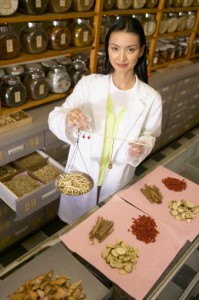In spite of the fact that traditional Chinese medicines (TCM) are all the rage in the alternative medicine marketplace these days, a new study has found that so many of these concoctions contain illegal and toxic ingredients that experts say they should be avoided entirely.
 According to The Telegraph, researchers from Murdoch University in Australia used DNA sequencing technology to identity the make-up of 15 samples of powders, tablets, capsules, flakes and herbal teas. Four of the samples contained either Asiatic bear of Saiga antelope matter, both of which are illegal to trade under international law. Others contained potentially toxic plant material and many failed to list ingredients that could provoke severe allergic reactions such as soy and nuts.
According to The Telegraph, researchers from Murdoch University in Australia used DNA sequencing technology to identity the make-up of 15 samples of powders, tablets, capsules, flakes and herbal teas. Four of the samples contained either Asiatic bear of Saiga antelope matter, both of which are illegal to trade under international law. Others contained potentially toxic plant material and many failed to list ingredients that could provoke severe allergic reactions such as soy and nuts.
Dr Michael Bunce, who led the study, said: “In total we found 68 different plant families in the medicines. Some of the TCMs contained plants of the genus Ephedra and Asarum. These plants contain chemicals that can be toxic if the wrong dosage is taken, but none of them actually listed concentrations on the packaging.”
The packaging was also found to be deceptive. For instance, one product which was labeled 100 percent Saiga antelope contained “considerable quantities” of sheep and goat matter.
Even more concerning is that some TCMs appeared to have been “intentionally adulterated” with prescription drugs such as anti-diabetic medicines, “presumably as a means to increase their efficacy.”
In spite of the research, which published in the PLoS Genetics journal, purveyors of TCMs insist that they’re less risky than conventional medicines.
Hui Jun Shen, President of the Association of Traditional Chinese Medicine and Acupuncture UK (ATCM), told the Telegraph: “Compared with conventional medicine drugs, generally speaking, Chinese herbal medicine is much safer.”
But experts disagree. Edzard Ernst, Professor of Complementary Medicine at the University of Exeter, who was not involved in the study, said: “The risks of Chinese herbal medicine are numerous: firstly, the herbs themselves can be toxic; secondly, they might interact with prescription drugs; thirdly, they are often contaminated with heavy metals; fourthly, they are frequently adulterated with prescription drugs; fifthly, the practitioners are often not well trained, make unsubstantiated claims and give irresponsible, dangerous advice to their patients.
“Taken together, these risks amount to a significant potential for harm – I would not recommend Chinese herbal medicine to anyone.”
© All Rights Reserved, Living His Life Abundantly®/Women of Grace® http://www.womenofgrace.com









